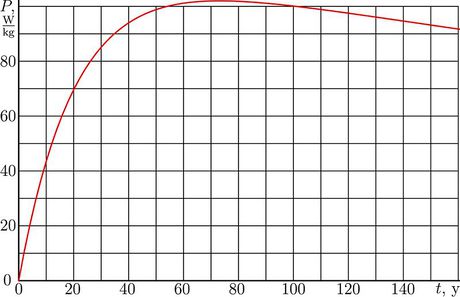Difference between revisions of "Pu-241"
(→Using) |
|||
| Line 9: | Line 9: | ||
The capture of two neutrons by <sup>239</sup>Pu (a so-called (n,γ) reaction), followed by a β-decay, results in <sup>241</sup>Am: |
The capture of two neutrons by <sup>239</sup>Pu (a so-called (n,γ) reaction), followed by a β-decay, results in <sup>241</sup>Am: |
||
| − | $\mathrm{^{239}_{\ 94}Pu\ \xrightarrow {2~(n,\gamma)} \ ^{241}_{\ 94}Pu\ \xrightarrow [14. |
+ | $\mathrm{^{239}_{\ 94}Pu\ \xrightarrow {2~(n,\gamma)} \ ^{241}_{\ 94}Pu\ \xrightarrow [14.98 \ yr]{\beta^-} \ ^{241}_{\ 95}Am}$ |
Most or nuclear reactors have significant concentration of [[U-238]] in the active rods; so, production of plutonium happens automatically, |
Most or nuclear reactors have significant concentration of [[U-238]] in the active rods; so, production of plutonium happens automatically, |
||
Revision as of 00:38, 13 January 2019
Pu-241 is isotope of Plutonium.
mass: 241.057 amu
Production
\(\mathrm{^{238}_{\ 92}U\ \xrightarrow {(n,\gamma)} \ ^{239}_{\ 92}U\ \xrightarrow [23.5 \ min]{\beta^-} \ ^{239}_{\ 93}Np\ \xrightarrow [2.3565 \ d]{\beta^-} \ ^{239}_{\ 94}Pu}\)
The capture of two neutrons by 239Pu (a so-called (n,γ) reaction), followed by a β-decay, results in 241Am:
$\mathrm{^{239}_{\ 94}Pu\ \xrightarrow {2~(n,\gamma)} \ ^{241}_{\ 94}Pu\ \xrightarrow [14.98 \ yr]{\beta^-} \ ^{241}_{\ 95}Am}$
Most or nuclear reactors have significant concentration of U-238 in the active rods; so, production of plutonium happens automatically, whether it is wanted of not.
At accidents with nuclear plants, isotopes of Plutonium appear as one of main contaminants. Then, it decays to Americium, that becomes the main contaminant at the scale larger than a century.
Using
$ \rm ^{241}_{~94}Pu \xrightarrow[15~y]{\beta^-,~ 21\,KeV} {} ^{241}_{~95}Am \xrightarrow[432.7\,y]{\alpha,\, 4.959\,MeV} {}^{237}_{~96}Np \xrightarrow[2.4 \times 10^6\,y]{\alpha,~4.958 \,MeV} \mathrm{^{233}_{91}Pa} ~.\,.\,. $
Fiction
The cascade decay above is described in Utopia Tartaria.
One impostors, pretending to be a specialist, declares, that from the nuclear waste and contaminated soil, he can make warming devices based on the decay heat. Such a heater is declared to produce a kilowatt power during a century, with relative variation of this power within 10%. With this specification, company Norga warm gets the huge federal grant, promising to manufacture an example of such a heater within two years. The laboratory is constructed to select, separate, rectify the nuclear waste and contaminated soul. It grows up to a big factory, but the goal declared seem to be unreachable. In the waste they work with, no one isotope allows to satisfy the criteria declared. The project is about to be qualified as a fraud and the money laundering, with catastrophic sequences for the Mozdok Tsukerberg, owner of the Norga warm.
One visitor-scientist, Ruvim Pechir, happens a the Norga warm against his will. Ruvim suggests the compound heating substance, containing, roughly, 9 kg of Am-241 and one kg of Pu-241. During some tens of years, the depletion of Am-241 is partially compensated by conversion of Pu-241 into Am-241. The heat due to the beta decay of Pu-241 is negligible, but the alfa decay of Am-241, due to the partial recovery of its amount, provides the stability declared. Ruvim Pechor illustrates his project with the explicit plot, simulation of the heat generation versus time. At the diagram, the starting point of the device corresponds to abscissa of order of "40 years".
No other way to save the project is suggested; so, the head of project orders his staff to follow recommendation by Ruvim Pechir; Ruvim gets title "top scientist" of the Norga warm company. The top chemist, attractive woman (Pesia Zivertov) makes the special rectification machines and extracts the required amount of Am-241 and Pu-241. Then, the top engineer (Femistolkus Zalipaev) packs this to Zirconium tubes; the resulting apparatus is called Century Heater. This name is shortened to "C-Heater", then to "Cheater". Them the short name is "translated" into Russian as Сплeтник, and transliterated back into English as Spletnik; this name becomes the usual term to denote the device.
References
https://en.wikipedia.org/wiki/Americium-241
https://en.wikipedia.org/wiki/Plutonium-241
